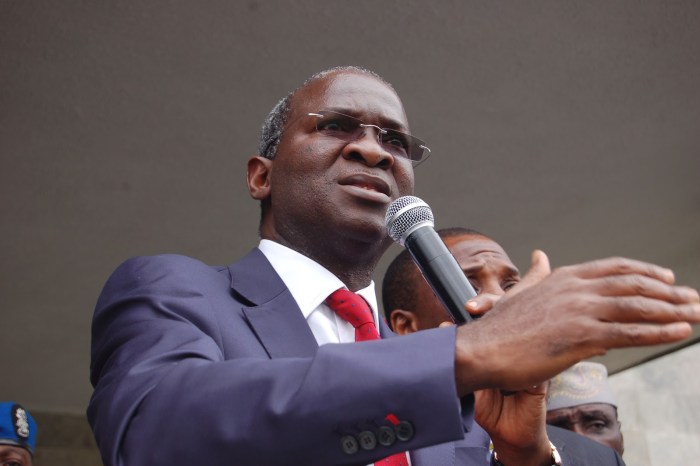
Minister for Power, Works and Housing, Mr. Babatunde Raji Fashola, has reportedly told Nigerians that instead of holding government responsible for power outage in the country, their outrage should be channeled to investors who acquired power assets in preceding dispensation.
Fashola was also quoted as assaying that “it is really not the federal government’s problem if power supply remains poor across the nation”.
According to Punch newspaper, Fashola made the declaration at the Nextier Power Dialogue on the night of Wednesday, December 12, 2018.
Power supply remains poor across Nigeria and load shedding is commonplace. On November 9, the nation’s power plants generated a miserable 3,762.60MW, down from 3,913.60MW attained on November 8.
Fashola reportedly told his listeners that since the power sector has been privatized, Nigerians should be channeling their outrage to the private investors who acquired power assets in the preceding dispensation. He added that his role as power minister is to fashion out policies and ensure that these policies are implemented.
‘If you don’t have power, that’s not the government’s problem’ “There are problems without a doubt and we must deal with them. But let me remind you, all of the assets that the Ministry of Power used to control for power have been sold by the last administration before I came. And so if you don’t have power, it is not the government’s problem. Let us be honest.
“The people who are operating the power sector, generation and distribution are now privately owned companies. I am here because I am concerned. If your telephone is not working, it is not the minister of communication that you go to. Let us be very clear”, Punch quotes Fashola as saying.
He added that; “So for those of you who want to weaponise electricity, face the businessmen who have taken it up. Let us be honest. If your bank over-charges you interest, is it the minister of finance you go to? So let’s be clear. This is now a private business by Act of parliament 2005.
“My role is regulatory, oversight and policy, but I have a problem which is the fact that I can’t see a problem and turn my back, so I’m getting involved. So the people you should be talking to about transformers is not me, the ministry doesn’t supply transformers anymore.”
‘I never promised to fix Nigeria’s power sector in six months’. Fashola has come under intense criticism for reportedly saying that a serious government should be able to fix Nigeria’s perennial power challenge in six months, shortly before the APC sacked the PDP from the center in 2015. But the minister denies ever making the remarks that have been widely attributed to him.
“I have the video of what I said and where I said it and I think it was in 2014 in the run-up to the election and I was in Lekki, Lagos,” Fashola said.
The minister explained that the comment was made during the inauguration of the Lekki Independent Power Project (IPP) during his spell as Governor of Lagos State.
He said he had made related comments in the context of the connection of residents of Lekki to the IPP within six months.
“You may disagree with me, but I challenge anybody who has an alternative set of facts. We have the video here and we can play what I said and you can listen to it. If you have a different version, bring it out. I challenge you!” the minister snarled.
A nation in perennial darkness
Improving electricity generation and transmission was one of President Buhari’s core election campaign promises before the 2015 general election.
However, generation and transmission of power from the grid hasn’t exceeded a grossly inadequate 7,000megawatts since the APC led federal government unseated the PDP in May of 2015, amid complaints of inadequate gas supply to power stations and rupturing of pipelines by vandals in the country’s restive Niger Delta region.
In October of 2013, former President Goodluck Jonathan sold off the nation’s power sector to private investors, a move that was aimed at deregulating the sector and stimulating generation to the grid.
While the generation and distribution components of the power sector were handed over to private investors, the federal government retains a hold on the transmission arm of things.



